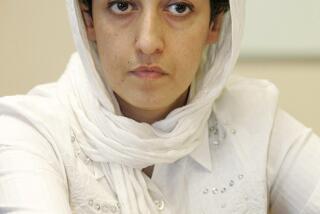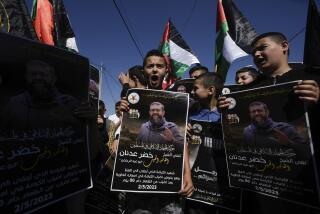Egyptian Lawyers on Hunger Strike Over Colleagues’ Jailing
- Share via
CAIRO — Mohammed Abdelaziz, head of the Cairo Lawyers Syndicate, has been hospitalized on a weeklong hunger strike, the latest development in a looming showdown between the Egyptian government and the Muslim Brotherhood.
Protesting the detention without charges of 59 lawyers, most of them Islamic fundamentalists, Abdelaziz, 60, was admitted for observation in a weak condition while Sayed Khalef, 53, secretary general of the lawyers’ syndicate, entered the fifth day of his own hunger strike.
“I found myself helpless to accept the requests of my colleagues to help them, so for the helpless person, death is better for him,” Khalef said Wednesday. “There are others who are ready to go on strike as soon as we die.”
The confrontation over the arrested lawyers--about half of whom were taken into custody after protesting the death in police custody of colleague Abdel Harith Madani--is the most serious eruption in the steadily declining relations between the Egyptian government and the nonviolent Islamic opposition, the most potent political opposition force in Egypt.
While Egyptian authorities have relentlessly sought to stamp out militant Islamic groups responsible for a wave of attacks on banks, foreign tourists and government officials, they have allowed the moderate Muslim Brotherhood to operate with relative freedom, though it is officially banned.
In recent years, the brotherhood has elected 40 deputies to Parliament under the banner of an allied political party. It runs a network of charitable institutions through mosques and maintains a vocal diatribe against the government through a widely read newspaper it controls.
Recently, the brotherhood has flexed its political muscles further, winning elections for control of a number of student and professional groups and syndicates, most prominently the Egyptian Lawyers Syndicate and the Egyptian Physicians Syndicate.
Though Minister of Interior Hassan Alfi as recently as a few months ago affirmed the government view that the brotherhood is not linked to recent terrorist attacks, authorities in the last few months have begun to move against it to try to stamp out its growing political influence.
A new law passed by Parliament will make it easier for the government to control union elections; a controversial new law also lets the government appoint village leaders, who had been selected by villagers and were often sympathetic to the Islamic movement.
Last month, the government took the unusual step of detaining the brotherhood’s Supreme Guide, Sheik Hamed Abul Nasr, on suspicion of distributing leaflets advocating violence.
President Hosni Mubarak has now publicly asserted that the brotherhood has links to violent activities, signaling the government’s determination to curtail it.
Every Egyptian president since the 1952 revolution has clashed with the brotherhood, and Saif Islam Banna, the son of the group’s founder, said the current repressive measures will not prevail.
“They are against this movement,” said Banna, who also heads the Egyptian Lawyers Syndicate. “But the question is, is it useful for the state to make a clash with the Muslim Brotherhood? Will society in Egypt accept this? Every time they try to make a clash, they become certain that the people will not accept it.”
Human rights and lawyers’ groups around the world have appealed for the detained lawyers’ release. Some are on the staff of the Egyptian Organization for Human Rights; others have defended prominent Islamic fundamentalists accused of anti-state terrorism.
Neither Abdelaziz nor Khalef is affiliated with the Islamic movement. But they have insisted the lawyers’ detentions, permissible for 60 days at a stretch under Egypt’s emergency law and indefinitely renewable on court order, are a civil rights issue.
More to Read
Sign up for Essential California
The most important California stories and recommendations in your inbox every morning.
You may occasionally receive promotional content from the Los Angeles Times.













